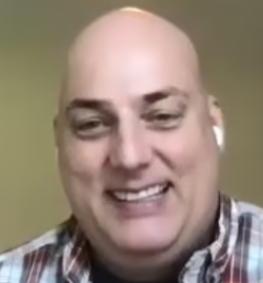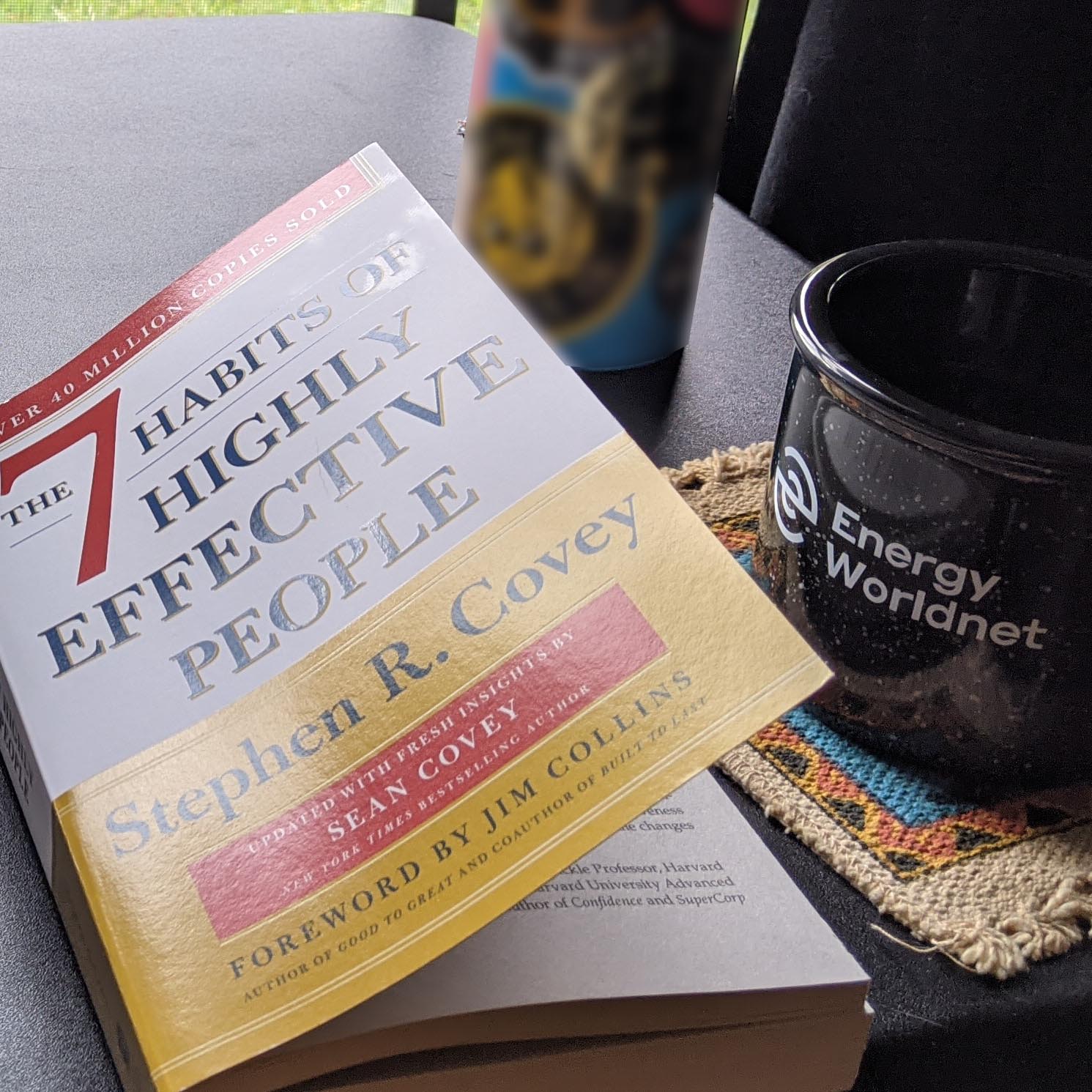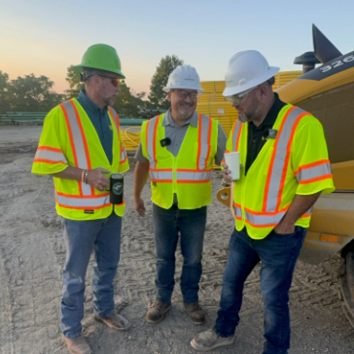Episode Transcript
Speaker 0 00:00:00 <inaudible>
Speaker 1 00:00:09 Good morning, energy community and LinkedIn community to this week's episode of coffee with Jim and James. I have to tell you, I could barely sleep last night when I think about black Hills energy and the over million customers serve in the dates. Yeah. That's first and foremost, but all of a sudden, I thought back, James, you're going to like this back to my heyday, back to the day of traveling <inaudible> West on my heart, my bike wind blowing my hair. Well, I used to have hair blowing back on my way to wall drug. I mean, my bike was fearless Kawasaki one 25. Well, I made it to the rally. The bikers saw it'd be acute wall decoration. I hope that bikes doing well. It was a long Greyhound bus ride home. Anyways, that's a tangent James, come in, get me off this tangent. Let's get us back on track my cohost as always the ying to my yang, Mr. James Cross, James, how are you today?
Speaker 2 00:01:05 I'm good. Um, you know, for those that don't know, we're recording on election day. So when this airs, you know, we'll, we'll figure out what this was all for, but we, we are, um, almost, almost giddy and nervous to have our guest on today. Mr. Brian Dressel from black Hills energy. Brian. Good morning. Good morning. Thanks guys. That's um, that's quite a buildup, you know, I hate to hate to think about anybody being nervous about talking to me. Ryan's been a long friend of ours in the industry. Um, you know, I, I can go back. Uh, my, my tenure with AWN ends them as long, but, um, I, I, by proxy, I feel like I knew Brian before I knew him before I even met him. But, uh, we've, we've had a lot of run ins since then, but, uh, uh, we're super excited to have you on board, uh, today. And, and for those that don't know, Brian's pretty much an expert at things. If we rewind to back, when, when Jim and James started, Brian would have had more podcasts under his belt than Jim did. So I had zero pressure, no pressure, Brian, but, uh, w we'd expect quite a bit from you. Yeah. All right. Well, I'll try not to disappoint with, thanks for that.
Speaker 1 00:02:22 Well, you don't Brian, let me, let me throw on a softball here. And, uh, if I can ask a question really, just to give a little bit of your background, because it is, uh, an unbelievable background of depth and breadth. Can you just give our audience a little bit about you and who you are and where you can come from and what you've experienced?
Speaker 2 00:02:41 All right. Yeah. Jim, I'm happy to do that. Um, I've been around the gas industry since 1990, so I'm going back to before we even had a operator qualification, which seems like a long, long time right now, but, uh, I am currently the technical training and operator qualification manager for black Hills energy. And
Speaker 3 00:03:00 I'm based in council Bluffs, Iowa. And, um, before I came to black Hills, I spent about 25 years with a gas company in the Kansas city, Missouri area. So a lot of experience in Kansas city, then I worked for a FEMSA, the pipeline and hazardous materials, safety administration for a few years, which was a wonderful experience. I learned so much more about code and what other operators are doing out there. So it was a great experience. And, uh, I ended my time with PHIMS as an instructor in their, uh, inspector training and qualification center in Oklahoma city, where I got to train state and federal pipeline safety inspectors. So it was a great experience.
Speaker 2 00:03:38 That's awesome. Yeah. Um, Brian, as you just told us in the, in that quick history, um, in the industry and just your variety of experiences given, you know, really you a unique perspective when it comes to operator qualification. So when we go back to the origin of the OCU role and all the way through the current, and even looking into the future, what do you see? And can you speak a little bit on that evolution and where you feel the biggest opportunities might be moving forward for, for our industry's growth in OCU?
Speaker 3 00:04:13 Sure. James, um, yeah, in a lot of people don't realize this, but the OCU rural really goes all the way back to 1992, when it was mentioned in the pipeline safety act in, uh, 1992, it wasn't fully implemented until 2002. And, you know, a lot of good things I think about OCU, but, uh, there was one sort of an unfortunate thing to it is that, you know, as the regulatory, uh, agencies started putting more and more emphasis on qualification, some of the operators that were out there with really good training programs, they started to dedicate less and less resources to training as they shifted toward a more of a qualification, uh, based program, which was somewhat unfortunate because that wasn't the intent of the OCU rule. It was just to add the qualification layer on top of training. So, um, operators in recent years, probably in the 2010s have really figured that out, that they needed to dedicate, you know, a balanced amount of resources really to training in qualification.
Speaker 3 00:05:16 So that's a really good trend in the industry and, you know, we're, we hope that continues. And we're certainly, you know, investing a lot of, uh, resources in training here at black Hills energy, which is, uh, you know, greatly improving our programs. We're really happy about that. So one aspect of OCU also is that, you know, when it first came about, the regulatory folks were pretty, um, we're pretty lenient, you know, when it came to Oki violations and some that's somewhat changing as well because Oak has been around for nearly 20 years. So the regulators are more aggressively, uh, enforcing OCU violations, which that's not a, that's not necessarily bad thing. I mean, we need to make sure that we're in compliance with the rule and, uh, another aspect of OCU. That's interesting. It was interesting to me, he's one of the supervisors that I worked with at <inaudible>.
Speaker 3 00:06:08 He told me that, um, nearly every incident or accident that you investigate, whether it's a regulatory inspection or an operator conducted inspection, if you dig hard enough and thorough enough, you're going to find, uh, some sort of a, either a training or an OCU issue. So that's a really interesting thing. I agree that there's usually some sort of a training and qualification issue in those incidents, but you really have to look for them. So that's a good thing for operators to be looking for as well. And you know, when we're talking about the current state of OCU, there's really a couple of issues that operators really need to be looking at. And one of them is span of control and the other is contractor management. So, you know, span of control was really intended as a training tool. Um, so that's the best way to look at it as a, as a training tool and contractor management, you know, the days of operators just getting records from their contractors and then filing them away those days are really gone. Now operators need to be more, uh, involved in that, you know, and actually audit the contractors and you'll make sure they're doing what they need to be doing to be in compliance with your OCU plan. So the, uh, state of OCU now is much more advanced from what it was, you know, 10, 20 years ago. So we're on a good trajectory.
Speaker 1 00:07:25 Brian, let me, let me, you, you hit a nerve with me when you were talking about the training and the education, the knowledge, skills, ability, all that, not just internal, but external. And it also raised a point. I was making fun today about my travels across high 90, but I, 90, as we know is a corridor that has very extreme conditions and extreme conditions for you up there are very different for it right now. And I'm in Southern Florida, we have different conditions and then our industry known as abnormal operating conditions or AOC. How, how big of a effect those have in your daily life as far as training to make sure that the people that are in your systems know what you guys have, that's unique to you that may not be the same for us in the Gulf coast.
Speaker 3 00:08:11 Yeah, Jim, that's a great question. And, you know, AOC is, are really unique to each operator and that's why we can't. I have like a list from the industry. I mean, we could have a list, but then operators would need to customize that list to their operations. And, uh, you know, in the training world, the challenge that we have in training and evaluating for AOC is, is that they're dangerous. So, you know, it's pretty hard to, to evaluate how someone's going to recognize and react to an AOC. And that's what the regulatory requirement is. So, you know, we can't just start a fire next to someone and then evaluate how they react to it because we might hurt that person. So, um, there are new technologies out there now, which is, um, really awesome, uh, virtual reality, reality, things like that. And, um, you know, so there's vendors out there.
Speaker 3 00:08:59 I know energy world that's involved in this and GTI, um, that are building applications for the industry that, uh, allow operators to really safely create that AOC. And then you can determine how the individual recognized and reacted to it. And, you know, a really quick little kind of an analogy I like to use when I'm talking about AOC is, is, you know, right now in the industry, we use knowledge testing, you know, pretty much across the board to assess how someone's going to recognize and react to an AOC. If you take a situation and it's not a pipeline, a AOC, um, it's something that's kind of similar though. Like if, if you gave me a knowledge test and he said, Brian, I'm going to ask you, how are you going to recognize them, react to the situation? The situation is you're driving your vehicle down the road.
Speaker 3 00:09:44 You see a snake come out from under the seat of your vehicle. As you go on 70 miles an hour down the interstate, how are you going to react to that? Then my answer is going to be well, I would apply the brakes slowly, turn on my signal, make my way to the shoulder, put it, put the vehicle in park, turn on my four way flashers, exit the vehicle safely. Well, that's not what I'm going to do in a real situation at all. I'm going to probably wreck my vehicle. You know, somebody is going to, they're going to need the jaws of life to get me out of my vehicle because I'm probably going to go right off the road because it's going to scare me. So by being able to recreate these AUCs and, um, a safe environment, we can really do a more accurate assessment of, you know, how someone's gonna react and or how they're going to recognize and react to that AOC. And also get them to understand, you know, this is something that could occur because by going through that simulation. So the new technology is really helping us a lot in that environment
Speaker 2 00:10:34 And Brian, you and I both, um, and Jim, even Jim, uh, to Don Donda headset and, you know, experience that firsthand and, and been a part of this kind of beta portion of it. And there's, there's really nothing like it. Um, you know, that freedom to fail as we talked about, you know, which it sounds like a negative term, but really being able to be in that situation, you know, get your bearings, understand it, you know, feel it. I just can't explain to people when you've done that headset, what it feels like. I mean, it feels like you're there. And, and, um, you know, when we think back of watching videos or taking those knowledge assessments, there's no comparison to it. And Brian, you've been behind the curtain a bit on, on this ramping, up in our industry. You know, what, how do you feel about that? How do you feel VR is going to change at least how AOC is function?
Speaker 3 00:11:36 Well, I think it's gonna really help better prepare the, uh, individuals that are performing tasks out there. You know, if you think about it, like if you can create a fire in that virtual reality situation, you know, other folks may look at this and say, well, it's not realistic. Well, it feels very realistic because of the immersive nature of the technology. And if you can have someone where they're actually performing a function and then that fire breaks out or whatever happens, it's pretty realistic. And then you get to go through the same adrenaline rush and everything as the person responding to it as you would, if it was happening in real life only, there's no danger. So I think it's going to really better prepare our workers in the industry for the challenges they face from AOC. Yes,
Speaker 2 00:12:20 It's really an equalizer. I've put it on. I put the headset on, you know, we'd been at shows or whatever, and had it now. And, uh, you know, had people come up say, Oh, I never did that. It's just video game stuff. You know, or my, my grandson has one of those or whatever that comment might be. But I, I tell them, I just give it one second, just put that headset on, look around and I'm telling you it'll change your mind. And it's funny how quickly it really does it. It levels that playing field when it comes to that experience. But Brian, you guys are doing innovative things. There's no question. I've got one more question for you. Very important question. Most important question of the day. No doubt about it. So hopefully you studied for this one. Brian, do you love what you do?
Speaker 3 00:13:08 Oh, absolutely. It wouldn't be doing it if I didn't.
Speaker 2 00:13:12 Well, that might be the shortest answer. I'll just go off, down, down a path for us, but he's so there's, there's no question in what you've already done for the industry. You know, being a recovery, a recovering, a Steve Allen always says a recovering regular, uh, regulator, very important for us to be able to see, see what you're doing and doing the great things you're doing out there. We appreciate you. Uh, keep, keep doing those. We're thankful you were on the show today. Uh, any parting thoughts?
Speaker 3 00:13:46 Um, well I just, you know, something occurred to me when we were talking about virtual reality is we did a demonstration, uh, and it was where we went up in a lift, you know, and it's a virtual reality simulation. Now our feet are on the ground. We went up in this lift and, uh, at some individuals who were afraid of Heights and you could actually see them, their knees start to shake because of the realism of it. So, you know, that tells you how realistic that is. So, um, no, I think that are, you know, a lot of great things happening in our industry right now. And, uh, I'm excited to be a part of it. And I appreciate the opportunity to visit with you guys today.
Speaker 1 00:14:22 It's absolutely our pleasure. And if we don't have anything more, James, I can wrap us up and down the road so we can, uh, get on with the great day. Brian, thank you. On behalf of James and I for joining us today again, long time alliances friends, um, we appreciate you. We appreciate everything that you're doing in the industry. I would absolutely encourage our audience to definitely connect with Brian follow black Hills, see all the good things that they're doing. They want the best for our industry, our people. And first and foremost, I'll put these words. I'll probably, you know, put them in Brian's violet, but safety first let's do everything safe. That's, you know, that's a cornerstone, the Keystone to everything. So again, please connect with Brian follow black Hills energy. We hope that you all stay safe. Have a great day. God bless you. God bless her industry. And then till next time on cough with Jim and James, have a great week, take care, everybody
Speaker 0 00:15:26 <inaudible>.


